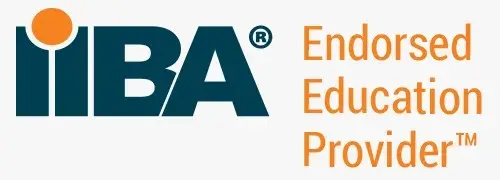What is ECBA Certification?
The full form of ECBA is Entry Certificate in Business Analysis. This certificate is awarded by International Institute of Business Analysis (IIBA), Canada.
The ECBA certification is an entry-level certification, and it is suitable for individuals who have little or no experience in business analysis. The International Institute of Business Analysis (IIBA) offers the ECBA certification to people who are new to the discipline of business analysis.
The ECBA certification verifies the candidate’s core knowledge of business analysis and demonstrates to the employer that the candidate is competent and has the necessary knowledge to carry out the in-demand roles of the business analysis field. It evaluates one's familiarity with and comprehension of basic concepts, rules, and methods of business analysis
Is ECBA worth it?
A business analyst job profile is a high-rewarding career option, which is worth your time and budget. An ECBA certification can help you get recognition in the business analysis domain and help you explore global job opportunities. Here are some benefits of pursuing an ECBA certification.
1. ECBA highlights your fundamental knowledge of Business Analysis
If you hold an ECBA certification, you can demonstrate to a potential employer that you have the necessary foundational knowledge of business analysis areas such as requirements analysis, recruitment life cycle management, and various business analysis techniques as mentioned in the BABOK guide. Moreover, an ECBA certification is offered by IIBA, which is a highly reputed Institute for business analysts.
2. Global recognition
The ECBA Certification is globally recognized, which means you can get global recognition in the field of business analysis. You can easily get entry-level business analyst jobs around the world.
3. Good job opportunities
Studies have shown that companies look to hire certified professionals, and the same is the case for business analysts. An ECBA certification establishes your credibility as an entry-level BA, demonstrating your dedication to the profession and commitment to preparing for and passing the ECBA exam. Ultimately, with an ECBA certification in hand, you open doors to outstanding job opportunities.
In India, the average salary of entry-level business analysts is INR 610,702 as per payscale.com, while in the United States, according to Glassdoor, the average salary for a Business Analyst entry-level is $93,041 per year.
4. Building more connections
As an ECBA certification holder, you get access to a pool of other professionals in the business analysis domain. You can join the IIBA LinkedIn group, IIBA ECBA group, or other meeting groups to connect with experienced as well as entry-level business analysts.
See our in-depth post on How to become a business analyst in India for more information.
What are the requirements for writing the ECBA Exam?
Every candidate who wants to take the ECBA examination, regardless of their previous work experience, has to meet certain eligibility criteria, as below:
Note: You no longer need 21 PDUs to be eligible to write the ECBA Exam. Also the application form has been discontinued.
ECBA Certification Cost
ECBA Certification Fees comprises of two components – Membership Fees and Exam fees. Though you can also take the exam without becoming a member, though it will cost you more.
The membership fees is dependent on the country, you live in. IIBA has segregated the countries in three regions:
- Region I Countries: USA, Canada, Australia, United Kingdom, United Arab Emirates & more..
- Region II Countries: Singapore, Taiwan, South Africa & more…
- Region III Countries: India, Argentina, Pakistan & More..
The table below shows the ECBA Fees region wise for members and non-members.
|
Region I |
Region II |
Region III |
| Membership fees |
$139 |
$89 |
$55 |
| Application Fees |
0 |
0 |
0 |
| Exam Fees (Members) |
$195 |
$195 |
$195 |
| Exam Fees (Non-members) |
$350 |
$350 |
$350 |
| Exam Re-Write Fees (Members) |
$95 |
$95 |
$95 |
| Exam Re-Write Fees (Non-members) |
$250 |
$250 |
$250 |
ECBA Syllabus
The ECBA certification examination is based on the Business Analysis Body of Knowledge (BABOK) guide. The BABOK guide is structured into knowledge areas, techniques, perspectives and competencies. The weightage of the knowledge areas is provided below:
(This is Valid from 1st March 2021)
| Knowledge Areas |
Weightage |
| Business Analysis Planning & Monitoring |
5% |
| Elicitation & Collaboration |
20% |
| Requirements Life Cycle Management |
20% |
| Strategy Analysis |
0% |
| Requirements Analysis and Design Definition |
25% |
| Solution Evaluation |
0% |
| Business Analysis and the BA Professional |
2.5% |
| Underlying Competencies |
5% |
| Business Analysis Key Concepts |
5% |
| Techniques |
17.5% |
| Total |
100% |
View some sample interview questions for entry-level business analysts
ECBA Exam Information
ECBA exam is a multiple-choice questions-based exam. The exam has 50 questions. You can take this exam from home. The exam is conducted by PSI.
You need to have a webcam and have a good internet connection to take the exam from home. Key points about the ECBA certificate exam are:
- There are 50 MCQs to be completed in 1 hour
- Each question will have four options.
- Every question will have one correct answer.
- There is no negative marking.
You can check the FAQ section on PSI website for more details on – how the exam is conducted and other requirements.
You can check our ECBA practice test to understand the questions type and exam pattern.
The natural question is to know about the passing criteria for this exam. To know more, visit our article on ECBA Passing score.
ECBA vs CCBA vs CBAP
IIBA offers three core Business Analysis certifications – ECBA, CCBA and CBAP. CCBA (Certification for Competency in Business Analysis) and CBAP (Certified Business Analysis Professional) are for meant for experienced business analysts. ECBA, on the other hand, does not require any business analysis experience.
Here are the key differences between ECBA, CCBA and CBAP:
Scroll Right for More
| ECBA |
CCBA |
CBAP |
| Must be registered for an account with IIBA |
3,750 hours- Business analysis work experience within the last 7 years. |
7,500 hours of Business Analysis Work Experience within the last 10 years. |
| No Business Analysis experience needed. |
Within the 3,750 hours, you require 900 hours spent in 2 of the 6 BABOK guide knowledge areas and
500 hours completed in 4 of the 6 BABOK guide knowledge areas. |
Within the 7,500 hours, you need a min. of 3600 hours completion in 4 of the 6 BABOK Guide Knowledge
Areas, that is 900 hours for each knowledge area. |
| Agree to Code of Conduct. |
Minimum of 21 PDUs in the last 4 years. |
35 hours of PD (Professional Development) within the last 4 years. |
| Agree to Terms and Conditions. |
Provide Two references. |
Two references. |
|
Agree to Code of Conduct. |
Agree to Code of Conduct. |
|
Agree to Terms and Conditions. |
Agree to Terms and Conditions. |
ECBA Certification preparation
IIBA Entry Certificate in Business Analysis is one of the top certifications for business analyst aspirants. Getting ECBA Certified will help you in your journey to become a Business Analyst. But is just getting certified enough? The answer is NO.
If you want to transition to a Business Analyst, you need to learn formal Business Analysis skills and get ECBA Certified. Our IIBA Endorsed ECBA Certification training is designed to help you achieve both. People from various educational backgrounds can enroll in this course, whether or not they have an IT background.
It is a dual-purpose course that will help you learn formal BA skills as well as prepare you for ECBA Certification along with that it also offers Job interview preparation, One-on-One feedback sessions, Business Analyst Interview Audiobook and more that will assist you in securing your dream job. Enroll now to avail an early bird offer.
![ECBA-Certification-Training]()




